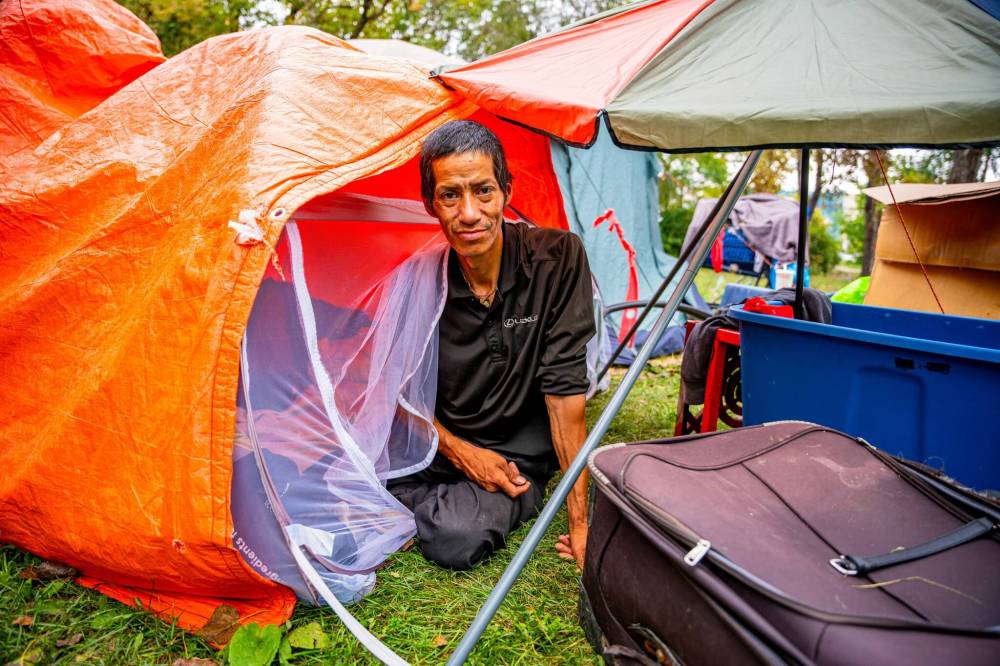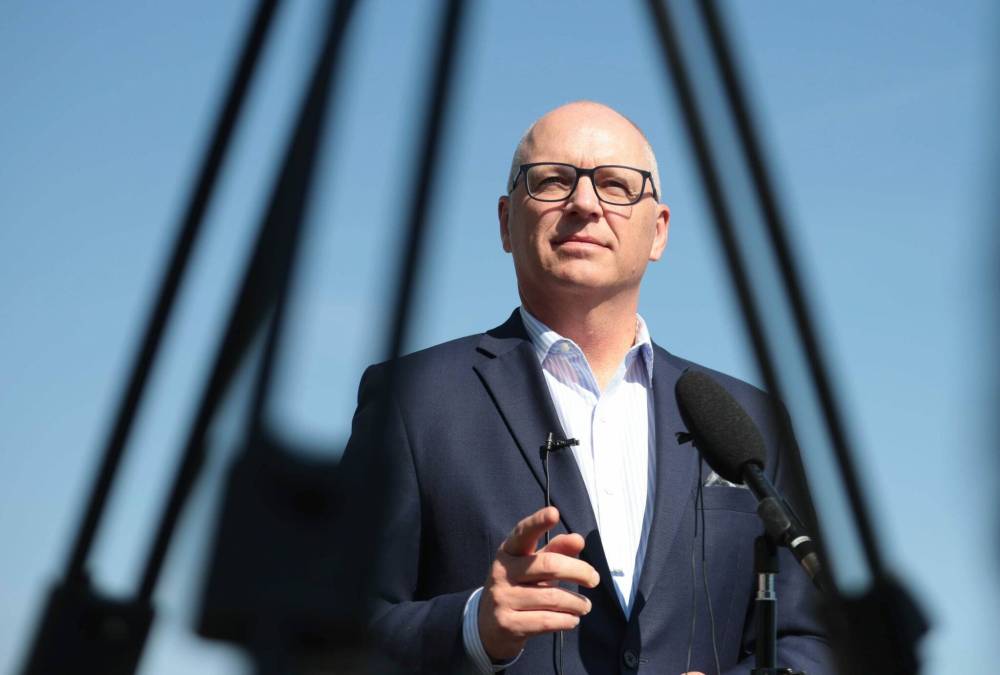Winnipeggers believe the city and province are doing a poor job of tackling homelessness — and they’re getting impatient with the time it’s taking to address its root causes, a new poll finds.
The survey also showed about half believe homeless people shouldn’t be allowed to live in encampments for as long as they want, even though two-thirds acknowledge the camps can’t be eliminated without housing.
Those are the major findings of a new Probe Research poll, which surveyed 480 Winnipeg adults online from the company’s own panel between Aug. 1 and 9.

NIC ADAM / FREE PRESS
Dirk Franklin, 43, a resident of an encampment near the legislature, says he feels safer here than at a shelter.
“I don’t think we’re seeing much of a distinction between the province and the city. It’s pretty clear they believe they’re not doing a good job,” said Probe’s Mary Agnes Welch.
“It’s a bad job actually.”
Forty-six per cent believe the province is doing a poor job on homelessness, while 34 per cent said it is doing a fair job, nine per cent a good job and one per cent an excellent job.
Likewise, 51 per cent believe the City of Winnipeg is doing a poor job, with 32 per cent saying a fair job, seven per cent a good job and one per cent an excellent job.
“I know the current mayor, council and city staff are much more seized with homelessness, but the problem is the problem has become bigger and more intractable,” she said.
Winnipeggers are also getting impatient with amount of time it is taking to deal with the root causes of homelessness.
Seventy-six per cent of Winnipeggers strongly or somewhat agree that we need to be more aggressive about finding people places to live, 74 per cent say what we’re doing to deal with homelessness is not working and 56 per cent say it is taking too much time to deal with the root causes of homelessness.

“Winnipeggers want the root causes to be fixed,” Welch said. “They don’t want people moved and carried away. They favour treatment and generally helping.
“The problem is, all this takes time and people haven’t been seeing any progress.”
When it comes to encampments, 68 per cent say we can’t begin to close them until be build more affordable housing while only nine per cent strongly disagree and 10 per cent somewhat disagree.
But, when asked if people experiencing homelessness have a right to stay in an encampment if they want to, 47 per cent strongly or somewhat disagree while 31 per cent strongly or somewhat agree.
Welch said one response which surprised her was how Winnipeggers perceive the jobs social service and street outreach agencies are doing.
The poll showed 36 per cent of Winnipeggers believe the organizations are doing a good or excellent job, while 54 per cent say they are doing a fair or poor job.

Marion Willis, executive director of St. Boniface Street Links, said “the public is right — more needs to be done to address the root causes.
“Yes, we don’t have enough housing, but what people have to understand is, if people lost their housing because of addiction, if we don’t deal with their addiction then we aren’t dealing with homelessness.”
Willis said what’s needed isn’t just housing, but wraparound services including addiction treatment and mental health supports.
“Ending homelessness is not impossible — we just need to change our approach,” she said. “There’s no dignity with people living in an encampment. But once we get them into housing, we can work with them and you can inspire hope.”
In the last few months, both Mayor Scott Gillingham and Manitoba Housing, Addictions and Homelessness Minister Bernadette Smith have made trips to Texas to take a look at the so-called Houston model of addressing homelessness.
That city was able to house tens of thousands of vulnerable residents and slash the city’s homeless population by more than 60 per cent during the past decade.

Ruth Bonneville / Free Press Files
Mayor Scott Gillingham: ‘not moving fast enough for me.’
“Homelessness is a priority of mine and something the city is active in,” Gillingham said.
“The city is doing more than it traditionally did before, but I can appreciate how respondents feel because, unfortunately, people are still homeless in Winnipeg. It takes awhile to address these issues but it is not moving fast enough for me, it is not moving fast enough for council and it is not moving fast enough for people who are homeless.”
Gillingham said Houston has shown him, and other politicians and stakeholders, what can be done with a coordinated effort.
“We need housing with wraparound support,” he said. “What encourages me is the provincial government, city government and organizations are all saying the same thing.”
Smith said her government remains committed to end chronic homelessness in eight years.
“The previous government ignored this issue for years — they sold off social housing, slashed the budget to repair and maintain existing housing and provided little for new builds,” she said.

“This has created a lasting shortage of social and affordable housing in our province. We know Manitobans need good housing and supports to stay housed, which is why are investing over $116 million through budget 2024 to build 350 new social housing units and repairing 3000 units.”
Because the poll is taken from an online panel, no margin of error can be given. If that many people were surveyed in a random sample, the margin of error would be plus or minus 4.47 per cent 19 times out of 20.
kevin.rollason@freepress.mb.ca

Kevin Rollason
Reporter
Kevin Rollason is a general assignment reporter at the Free Press. He graduated from Western University with a Masters of Journalism in 1985 and worked at the Winnipeg Sun until 1988, when he joined the Free Press. He has served as the Free Press’s city hall and law courts reporter and has won several awards, including a National Newspaper Award. Read more about Kevin.
Every piece of reporting Kevin produces is reviewed by an editing team before it is posted online or published in print — part of the Free Press‘s tradition, since 1872, of producing reliable independent journalism. Read more about Free Press’s history and mandate, and learn how our newsroom operates.
Our newsroom depends on a growing audience of readers to power our journalism. If you are not a paid reader, please consider becoming a subscriber.
Our newsroom depends on its audience of readers to power our journalism. Thank you for your support.